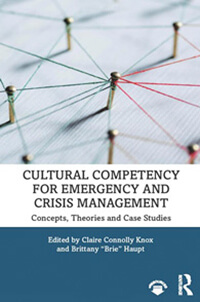Book Review: Cultural Competency for Emergency and Crisis Management: Concepts, Theories and Case Studies
Cultural Competency for Emergency and Crisis Management: Concepts, Theories and Case Studies; By Claire Connolly Knox and Brittany “Brie” Haupt, editors. Routledge; 276 pages; $49.95.
 From refugee health epidemics to the #MeToo movement and Black Lives Matter, news organizations and social media are brimming with global events detailing diversity conflict and at-risk population vulnerabilities.
From refugee health epidemics to the #MeToo movement and Black Lives Matter, news organizations and social media are brimming with global events detailing diversity conflict and at-risk population vulnerabilities.
Cultural Competency for Emergency and Crisis Management: Concepts, Theories and Case Studies sheds light on the various skills, knowledge, and abilities required in this field, which are often overlooked in the existing training curriculum.
Editors Claire Connolly Knox and Brittany “Brie” Haupt are accomplished within the field of crisis management, with shared professional experiences in environmental issues, disaster response, multiculturalism, and community development. They introduce the book through an excellent overview of the history and current state of emergency management.
Expanding on this, despite today’s headlines suggesting that cultural awareness during crises may be a daunting undertaking, the authors call upon major events including Hurricane Katrina and the terrorist attacks of 9/11 to detail how the field has developed and the key diversity issues of importance.
Educators and training programs will benefit most from the latter chapters and the bulk of the book’s content. They include a series of unique case studies for classroom use, followed by supplemental scenarios and questions to facilitate crisis management analysis and recommendations. The case study topics are relevant, including nine U.S.-based and three international scenarios such as active shooter response and disaster relief in conflict zones.
The initial subject matter overview is valuable reading for current crisis management practitioners. Ultimately, this book as a whole would be a welcome supplement to existing emergency management training curricula. One thing is certain, this book and other similar works are sure to become an integral portion of training regimens going forward.
Reviewer: Alexander Choren, CPP, PSP, leads international security vulnerability assessments, specializing in critical infrastructure including nuclear facilities, major transportation hubs, and research centers. He is the managing director of Rosca Solutions.